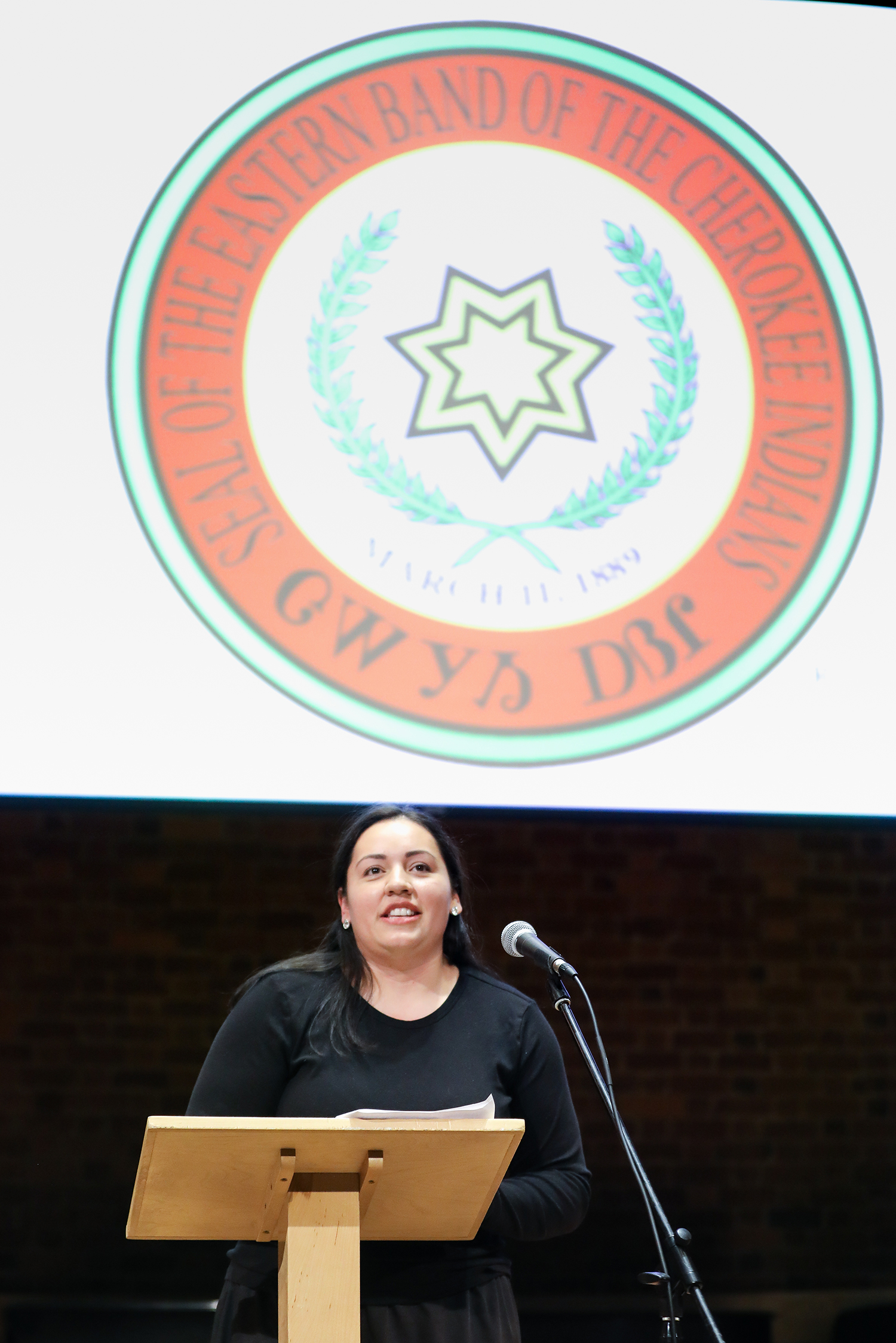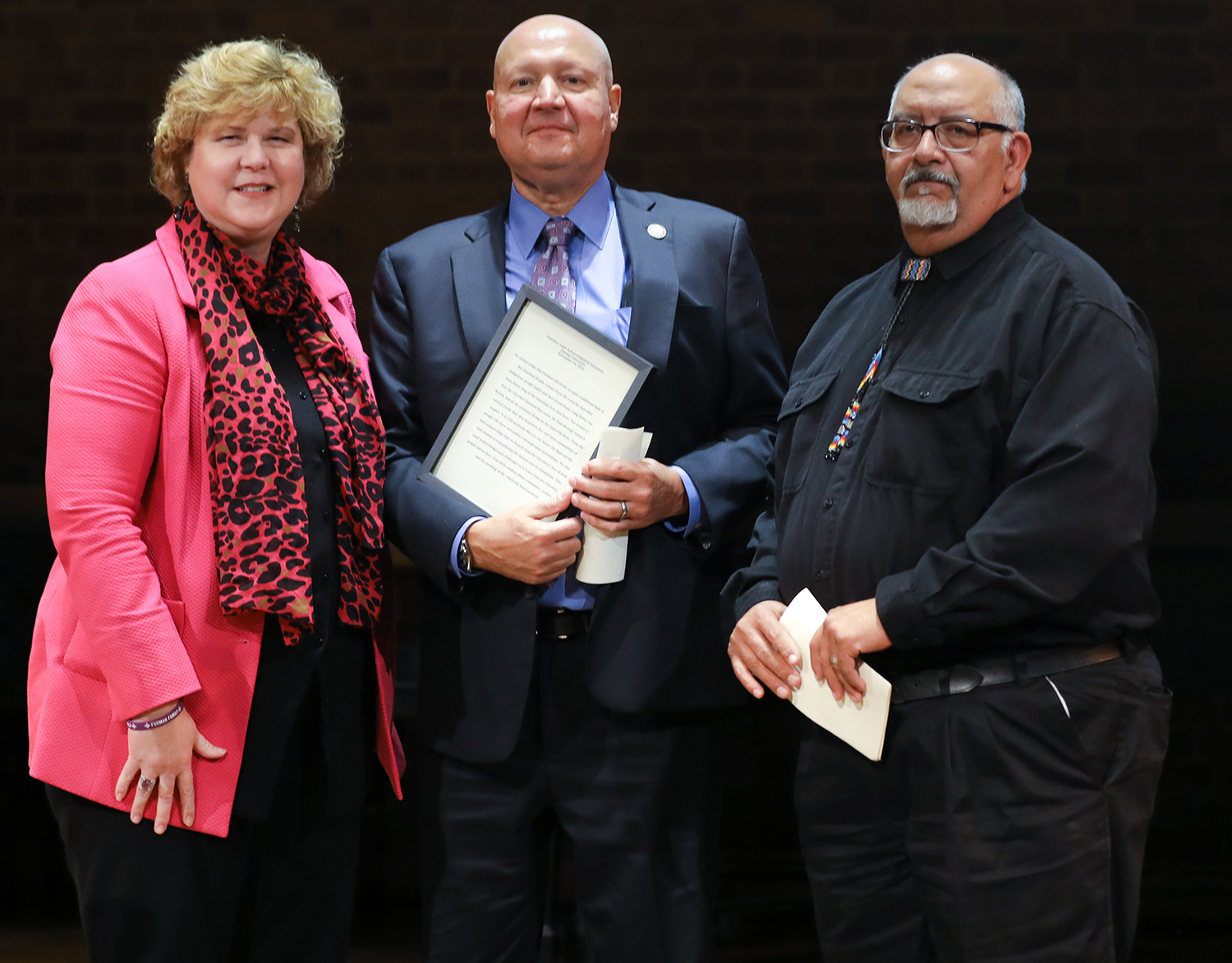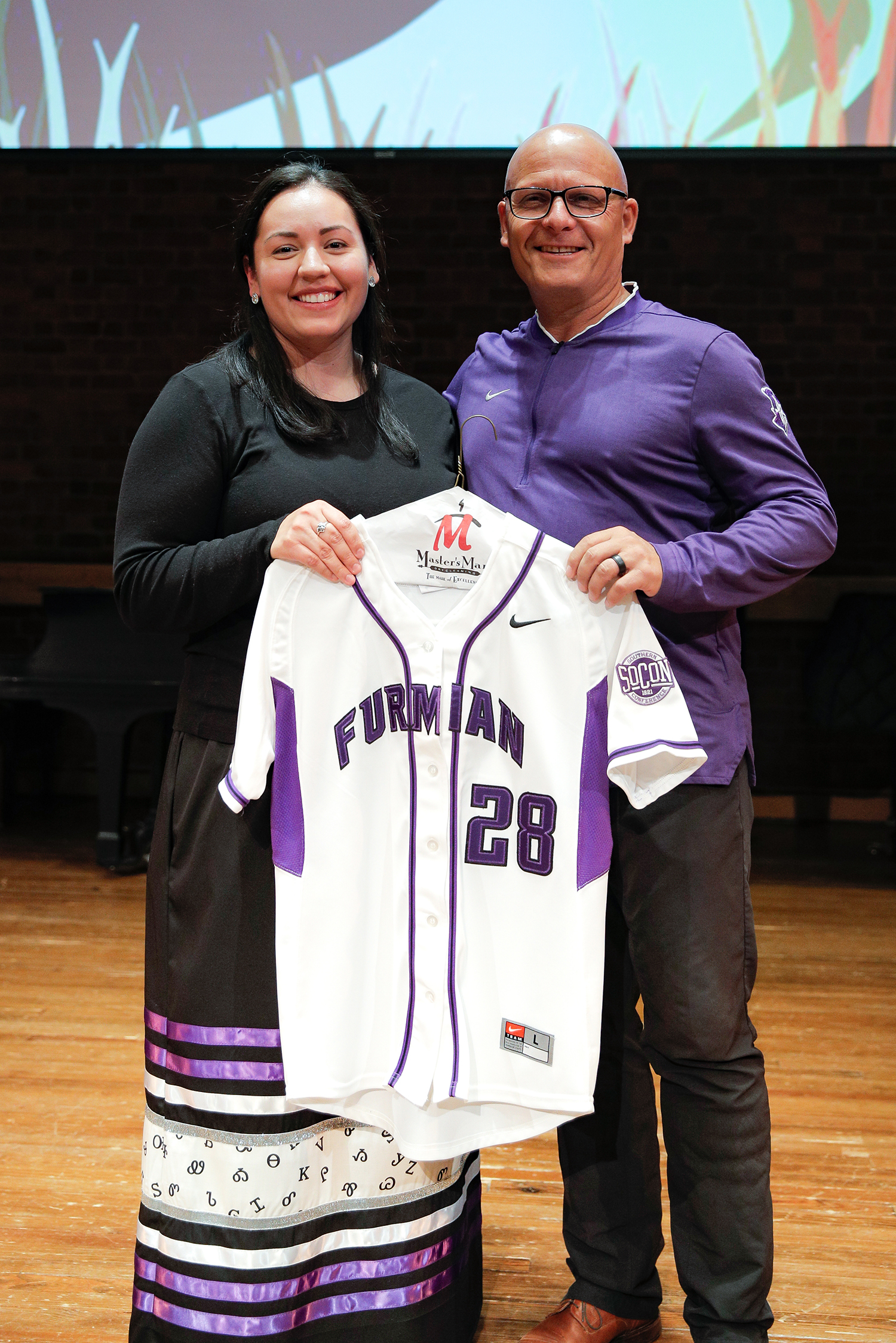Land acknowledgment recognizes campus was originally home to the Cherokee
Long before Furman University’s existing campus was created in the 1950s, before the words “a mountain river laves her feet” were written into the alma mater in 1907, and even before the land on which students attend classes and university business is conducted was plowed for cotton and corn, it was home to the Cherokee.

Shelby Parker ’15, Furman’s first known Cherokee student.
Furman formally acknowledged this history in a ceremony on Thursday, Nov. 14, with representatives of the Eastern Band of Cherokee Indians. The event was also in honor of Shelby Parker ’15, Furman’s first known Cherokee graduate. Parker, a political science major who also played softball for the Paladins, was presented with a plaque by Danielle Vinson, professor of politics and international affairs. Softball Coach Wally King also presented Parker with a team jersey with her number.
“Parker’s address was a moving statement about what it was like to be the only native student at Furman,” said Helen Lee Turner, the Reuben B. Pitts Chair of Religion and a specialist in religion in America.
A member of the Long Hair Clan, Parker began with a Cherokee greeting: “Siyo Nigada.” But, Turner said, Parker was honest about her experience as a Furman student. “She told us, ‘How lonely it was to be in a place where there was not a single Native American person.’ And there were many misperceptions that she is happy to see being corrected today,” Turner said.
“What an honor it is to be an alum of Furman University, where steps are being taken to broaden the horizons of students and faculty,” Parker said in her remarks. “We are here and we are not a ‘tribe that once was,’ and we are not a costume or mascot… . We are courageous, we are strong, and we are resilient.”
Parker currently works with a diabetes prevention program called Cherokee Choices in the tribe’s Public Health and Human Services Division.
Furman President Elizabeth Davis read the acknowledgment, which begins, “We acknowledge that Furman University occupies traditional land of the Cherokee People, a land where the Catawba and other indigenous people might also have found food.”
Davis also spoke of the Cherokee’s “core values of individual integrity, perseverance, courage and respect for tradition,” and of their communities of respect. “But perhaps most of all,” she said, “on occasions like this, we should think of how the Cherokee learned from the land itself and inspire us to do likewise.”
Yellowhill Tribal Council representative Thomas Wahnetah and Big Cove Community representative Perry Shell received an official copy of the statement on behalf of the Eastern Band of Cherokee Indians. They invited Davis to visit Cherokee and present the document in person.

Furman President Elizabeth Davis presented Yellowhill Tribal Council representative Thomas Wahnetah and Big Cove Community representative Perry Shell with an official copy of the land acknowledgment statement.
The land acknowledgement statement was initiated by students, Turner said. Wyatt Ware ’23, who is Western Cherokee and Blackfeet, took the idea to Kelsey Milian ’20, president of the Student Diversity Council, who was already working on a statement. Together, they worked with Turner to make the acknowledgment a reality.
Also present among the crowd of visitors, students and faculty were the inaugural members of the newly formed Native American and Indigenous Peoples Student Group. Ware is the group’s president and Hunter Alexander ’20, an Osage, is the treasurer. Manya Gerstley ’23, Cherokee and Blackfeet; Tyler MacAlister ’21, Native Alaskan; Bethany Knapp ’20, Choctaw; and Milian, K’iche Maya and Zapotec from Isthmus de Tehuantec, Oaxaca, Mexico, are also members.
Gabby Villagran ’20 created a graphic for the Land Acknowledgement Statement. It illustrates a river flowing from the mountains of Cherokee into the foothills where Furman is located. Under a new moon, a Cherokee village in the background is lit by the new fire of the traditional renewal festival. The sentiments associated with that festival are part of what the Land Acknowledgement hopes to capture, Turner said.
“This student group is formed with the aim of upholding indigenous principles of community and tradition, values that we believe are worthy of sharing with the students of Furman University and greater Greenville community,” Ware said.
After opening remarks from Provost Ken Peterson, who said he hoped the land acknowledgment would lead to better understanding of native and indigenous people, Milian explained the importance of the land acknowledgment statement. Alexander then talked about the need to tell the native people’s story, and Parker shared her thoughts on being Cherokee.
Faculty provided academic and historical perspectives. Turner spoke about how we might learn from Cherokee stories of the rivers, often called the “Long Man;” John Barrington, professor of history, talked about Cherokee land during the Revolutionary War; Lloyd Benson, the Walter Kenneth Mattison Professor of History, talked about the Trail of Tears; and Danielle Vinson, professor of politics and international affairs, discussed treaties and politics as they relate to the Cherokee. Margaret Oakes, professor of English and a member of the Choctaw Nation of Oklahoma, talked about ideas for future education events at Furman related to native and indigenous peoples.

Shelby Parker ’15, Furman’s first known Cherokee graduate, received a softball jersey with the number she played in at Furman from Coach Wally King.
The land acknowledgement statement will be put on a plaque that will be installed on campus.
The full statement reads:
“We acknowledge that Furman University occupies traditional land of the Cherokee People, a land where the Catawba and other indigenous people might also have found food. Long before our Alma Mater sang of the mountain river that laves ‘our mother’s’ feet, the Cherokee honored that water, the land through which it flowed, and all the creatures living on the land with them. From the natural world, they also learned to live and form communities of respect. It is with gratitude that we, too, honor the land and the people who have stewarded it through many generations. We also must acknowledge that we benefit from the Cherokees’ loss of land and commit to remembering the human cost of colonialism. This Land Acknowledgement challenges us to learn from the Cherokee people and to draw from their wisdom about community, resilience, and the meaning of life which this land nurtured.”